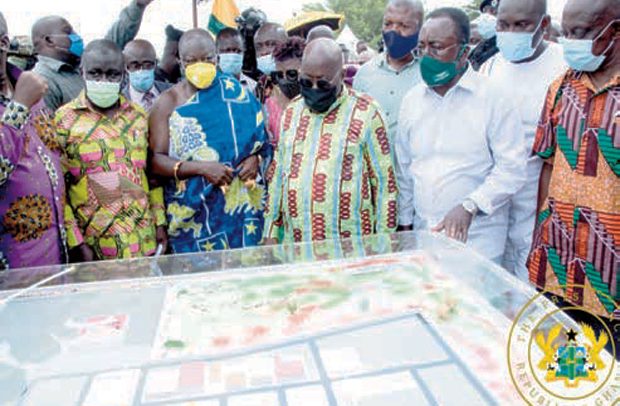President Akufo-Addo and Otumfuo Osei Tutu II inspecting the project’s design
President Akufo-Addo yesterday cut the sod for the commencement of work on the US$330 million Boankra Integrated Logistics Terminal Project, popularly referred to as the Boankra Inland Port Project, which has been on the drawing board for about 18 years.
The Ministry of Transport (MoT), acting through its agencies, namely the Ghana Shipper’s Authority (GSA) and the Ghana Ports and Harbours Authority (GPHA) initiated in 1990 the Boankra Integrated Logistics Terminal (BILT) in the Ejisu Municipality, near Kumasi, to create an Inland Dry Port as an extension to the Tema Port, and the NPP government led by then President John Agyekum Kufuor made efforts to bring the massive projects into fruition but it encountered a number of challenges, a significant one being the exit of the NPP government in 2009.
“However, in view of its considerable socioeconomic potential, this project was one of the pledges made in the NPP’s 2016 Manifesto, with the commitment to ensuring that it saw the light of day,” President Akufo-Addo said yesterday.
“It is, thus, heartwarming that, after 18 years since the conception of this project, work is now set to begin after the conclusion of all financial, contractual, legal, parliamentary and regulatory matters and approvals. The project period is three years,” he said.
The President explained that the Boankra project had been initiated to provide service to importers and exporters in the middle and northern parts of the country, and also to act as a major conduit for the efficient transportation of transit traffic to neighbouring landlocked countries like Burkina Faso, Mali and Niger.
The port upon completion will have inland clearance depot, customs bonded and unbonded estates, banks, offices and trading facilities, parking areas, light industrial areas and an administration complex.
The project will also offer significant employment opportunities for both skilled and unskilled labour during the two phases of construction and operation. Beyond the creation of jobs, there are other ancillary small and medium scale businesses that will be located within the enclave to support the operations of the terminal.
“It is noteworthy that the transformation of the Ghanaian economy, from a raw material producing and exporting one, to an industrialized one, will be given a huge impetus with the coming on stream of this facility. Government’s commitment to establishing firmly the economy of Ghana on a solid path of industrialization, with the view to delivering a vision of self-reliance, development and prosperity for all, is unwavering,” he added.
The concessionaire, Ashanti Ports Services Limited, a joint venture of Afum Quality Limited of Ghana and DSS Associates of the Republic of Korea, according to President Akufo-Addo, is committed to investing a total of $330 million for the realization of this project. Additionally, the concessionaire is expected to design, engineer, finance, procure, construct, operate and maintain the project and transfer title to the government after a 30-year period.
“It is my hope and expectation that the concessionaire will not renege on the confidence reposed in it, and will take all the necessary actions to deliver the project on schedule and on budget,” he added.
One of the success stories of the Africa economic integration agenda is the coming into force of the Africa Continental Free Trade Agreement (AfCFTA).
The objective of the AfCFTA is to promote trade among African countries, with the President stressing that “this will be buoyed by the presence of an effective and efficient transport system, especially as Ghana is playing host to the secretariat.”
President Akufo-Addo was hopeful that “this project and other similar infrastructure projects, such as the development of the Keta Port, the Tema-Akosombo Railway Line, and the ongoing port expansion projects at Tema and Takoradi Ports will make a positive contribution in ensuring that Ghana derives maximum benefits from the AfCFTA.”
From I.F. Joe Awuah Jnr, Boankra


